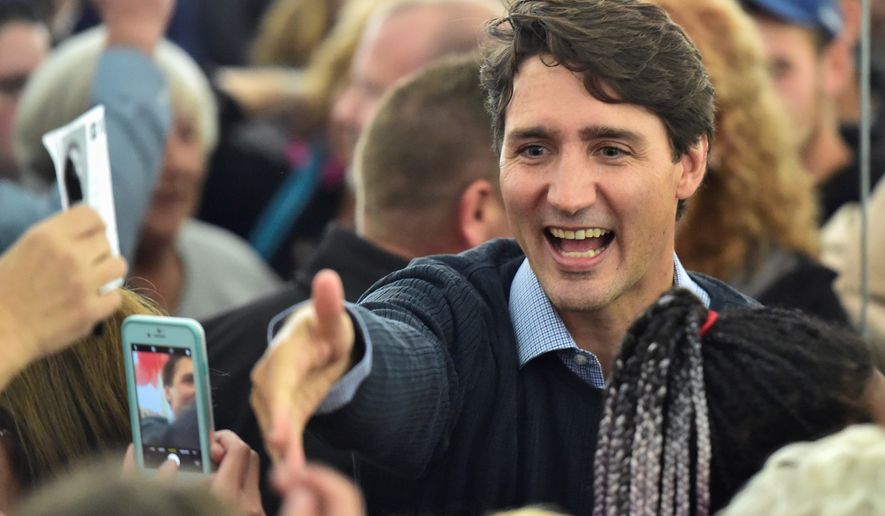President Trump’s threats to cut Canada out of a new NAFTA is not getting much support at home.
AFL-CIO President Richard Trumka, who reliably echoes Mr. Trump’s harsh criticism that the North American Free Trade Agreement has been a job-killer in the U.S., said Sunday that a new deal must include Canada.
“Look, our economies are integrated,” the labor union leader said on “Fox News Sunday.” “It’s pretty hard to see how that would work without having Canada in the deal.”
Congress members from both parties as well as U.S. business leaders also want Canada included to preserve the more than $1 trillion in trade under the 24-year-old trilateral deal.
Mr. Trump notified Congress on Friday that he was moving ahead with a U.S.-Mexico deal to replace NAFTA, possibly without Canada. The notice started a 90-day review period before Congress can ratify the deal.
He then balked at lawmakers who criticized the move, waring them not to “interfere” with the administration’s bare-knuckle negotiating.
“Congress should not interfere w/ these negotiations or I will simply terminate NAFTA entirely & we will be far better off,” Mr. Trump tweeted Saturday. “There is no political necessity to keep Canada in the new NAFTA deal. If we don’t make a fair deal for the U.S. after decades of abuse, Canada will be out.”
Sen. Lindsay Graham, a Trump ally, said he thought the president would get a deal that included Canada.
“I think Canada will be in it. He’s pushing hard. And he should,” the South Carolina Republican said on CNN’s “State of the Union.” “When it comes to lumber, we have always had a problem with Canada. But they’re our allies. They’re not our enemies.”
U.S. Trade Representative Robert E. Lighthizer said Canada could still join the U.S.-Mexico deal before the 90-day clock runs out.
After intense negotiations last week, U.S. and Canadian trade teams failed to strike a deal before Mr. Trump’s Friday deadline.
The talks broke down after a Toronto newspaper reported Mr. Trump’s off-the-record comment that he is not compromising with Prime Minister Justin Trudeau’s government and expected a deal “totally on our terms.”
At the same time, Mr. Trudeau’s team refused to bend on a top U.S. demand that Canada end high tariffs on dairy products and protections for lumber and paper industries.
The U.S.-Canada talks are set to resume Wednesday.
Canadian Foreign Affairs Minister Chrystia Freeland, the lead negotiator, said they would keep working for a deal that benefits Canadians, Americans and Mexicans.
“We’re not there yet,” she said. “The government of Canada will not sign an agreement unless it is good for Canada and good for Canadians.”
Mr. Trump wanted to start the required 90-day layover before Congress can ratify the agreement.
The Friday deadline was aimed at getting the deal approved before the Dec. 1 inauguration of Mexico’s President-elect Andres Manuel Lopez Obrador, a far-left politician who some fear will scuttle a deal.
The 90 days will run out Nov. 30.
Replacing NAFTA is a top priority for Mr. Trump, who calls the landmark trade agreement “the worst deal ever made.”
The negotiations to rewrite it dragged on for a year and Canada stayed on the sidelines this summer while the U.S. and Mexico executed the hard bargaining.
A tentative U.S.-Mexico agreement was announced Monday, when Mr. Trump first said he was prepared to move forward without Canada.
Rep. Kevin Brady, Texas Republican and chairman of the House Ways and Means Committee, said NAFTA needed updating and the president’s notification was an important step toward that goal.
“I also strongly urge Canada to step up and demonstrate that it can take on the ambitious obligations of the agreement with the aim of concluding a modern, seamless three-way agreement,” he said.
The U.S.-Mexico deal sought to end the mass exodus of manufacturing from the U.S., especially with automakers.
It would raise the minimum level of North American components in an automobile to qualify for tariff-free treatment under NAFTA from 62.5 percent to 75 percent.
The agreement also would boost wages for Mexican workers, keep agricultural products tariff-free, increase environmental standards in Mexico and overhaul rules for copyright and trade dispute resolutions.
The agreement would last 16 years, with an opportunity to review it and adjust the terms after six years.
A major sticking point for Canada is that the deal eliminated the settlement system for anti-dumping disputes, NAFTA’s Chapter 19.
The U.S. wanted to nix the system and Mexico agreed, but Canada wants the mechanism to fight the Trump administration’s tariffs on softwood lumber, paper and other products.
Mr. Trump wants Canada to end its tariffs on dairy products, which can run nearly 300 percent.
• Valerie Richardson and Dave Boyer contributed to this report.
• S.A. Miller can be reached at smiller@washingtontimes.com.




Please read our comment policy before commenting.